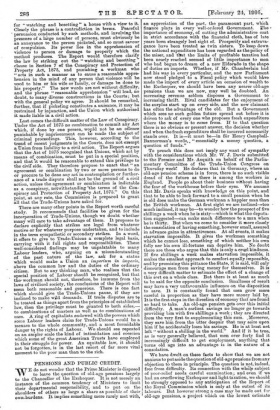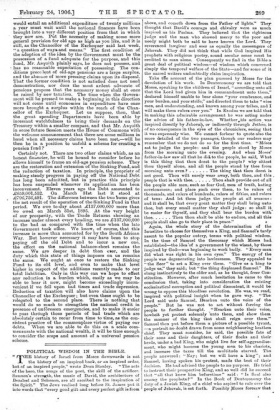PENSIONS AND PUBLIC CREDIT.
WE do not wonder that the Prime Minister is disposed to leave the question of old-age pensions largely to the Chancellor of the Exchequer. It is not merely an instance of the common tendency of Ministers to limit their departmental responsibility, and to put on the shoulders of others as large a share as possible of their own.burdens. It implies something more rarely met with, an appreciation of the part, the paramount part, which finance plays in every well-ordered Government. Wile importance of economy, of cutting the administrative coat in strict accordance with the financial cloth, has of late years been strangely lost sight of. Prosperity and. extrava- gance have been treated as twin sisters. To keep down the national expenditure has been regarded as the policy of the miser, and that the limits of profitable taxation had been nearly reached seemed of little importance to men who bad begun to dream of a new Eldorado in the shape of duties on imports. Whether, if Mr. Chamberlain had had his way in every particular, and the new Parliament now stood pledged to a Fiscal policy which would 14,ve made the import of every article an occasion of wealth to the Exchequer, we should have been any nearer old-ape pensions than we are now, may well be doubted. In increasing revenue seldom disposes a Government to increasing thrift. Rival candidates for the enjoyment of the surplus start up on every side, and the new claimant has often the advantage of the old. But a Government which sees no such golden future spread out before it is driven to ask of every one who proposes fresh expenditure where the money is to come from. If to that question there is no obvious or present answer, the decision whether and when the fresh expenditure shall be incurred necessarily stands over. It is—it must be—in Sir Henry Campbell- Bannerman's words„ "essentially a money question, a question of funds."
To preach this does not imply any want of sympathy with the considerations which Mr. W. J. Davis submitted to the Premier and Mr. Asquith on behalf of the Parlia- mentary Committee of the Trade-Union Congress on Thursday week! He declares that in Germany, where an old-age pension scheme is in force, there is no such visible dread of the future as there is among the workers in England. People go about their business without having the fear of the workhouse before their eyes. We assume that Mr. Davis speaks with knowledge on this point, and. that to be able to look forward to a small pension when he is old does make the German workman a happier man than the British workman. At first sight we are inclined—too much inclined, it may be—to wonder how the prospect of five shillings a week when he is sixty—which is what the deputa- tion suggested—can make much difference to a man when he is thirty. But when we come to consider it more closely the consolation of having something, however small, assured in advance gains in attractiveness. At all events, it makes starvation impossible. It gives the workman something which he cannot lose, something of which neither his own folly nor his own ill-fortune can deprive him. No doubt there are those who argue that this is only a cruel kindness. If five shillings a week makes starvation impossible, it makes the smallest approach to comfort equally impossible, and by promising this pittance the State, it is said, will only discourage men from saving money for themselves. It is a very difficult matter to estimate the effect of a change of this sort on a whole class. But there is at least as much to be said for the opposite conclusion. Smallness of result may have a very unfavourable influence on the disposition to save. It is constantly found that men grow more careful in proportion as they have more money laid by. It is the first steps in the direction of economy that are found so hard to take. An old-age pension gets over this initial difficulty. A man's earliest savings no longer go towards providing him with five shillings a week ; they are directed from the very first to supplementing this sum. ,Moreover, they save him from the utter despair that may seize upon him if he accidentally loses his savings. He is at least not left "without a shilling in the world." And. if it be true, as is very generally believed, that men over forty find it increasingly difficult to get employment, anything that turns old age into an advantage is in the nature of a consolation.
We have dwelt on these facts to show that we are not anxious to put aside the question of old-age pensions from any objection to them in principle. The question is not, indeed, free from difficulty. Its connection with the what) subject of poor-relief needs careful examination ; and even if we had. an overflowing Exchequer and light taxation, we should be strongly opposed to any anticipation of the Report of the Royal Commission which is only at the outset of its labours. But however strong a case may be made out fer old-age pensions, a project which on the lowest estimate a year must wait until the national finances have been brought into a very different position from that in which they now are. Put the necessity of making some more general provision for old age as high as you like, and it is still, as the Chancellor of the Exchequer said last week, "a question of waya and means." The first condition of the adoption of the idea by the Government must be the possession of a fund adequate for the purpose, and this fund, Mr. Asquith plainly says, he does not possess, and • has no reasonable expectation of possessing. The con- ditions precedent of old-age pensions are a large surplus, and the absence of more pressing claims upon its disposal. That the former condition is not satisfied does not need demonstration, nor does the most ardent advocate of pensions propose that the necessary money shall at once be raised by new taxation. The time wben the Govern- ment will be pressed to make a beginning in this direction will not come until economies in expenditure have once more brought a surplus within the reach of the Chan- cellor of the Exchequer. Let us suppose, then, that the great spending Departments have been able by incessant watchfulness to bring their demands on the .Treasury within a smaller compass, and that Mr. Asquith in some future Session meets the House of Commons with the welcome announcement that there are some millions in hand when all necessary claims have been met,—will he then be in a position to unfold a scheme for creating a pension fund ?
Certainly not. There are two other claims which, as an honest financier, he will be bound to consider before he allows himself to frame an old-age pension scheme. They are the restoration and extension of the Sinking Fund, and the reduction of taxation. In principle, the propriety of making steady progress in paying off the National Debt has long been admitted, but in practice this principle has been suspended whenever its application has been inconvenient. Eleven years ago the Debt amounted to £fi59,001,552. On March 31st last it stood at £796,736,491. The difference between the two %ums gives the net result of the operation of the Sinking Fund in that period. We owe to-day about £137,000,000 more than we owed on March 31st, 1895. At the very height of our prosperity, with the Trade Returns showing an increase under almost every heading, we are £137,000,000 to the bad as compared with the time when the late Government took office. We know, of course, that this increase is more than accounted for by the South African War. But however necessary it may have been to stop paying off the old Debt and to incur a new one, the effect on the national balance-sheet remains the same. We are deeper in debt than eser, and the duty which this state of things imposes on us remains the same. We ought at once to restore the Sinking Fund to its old level, and even to make that level higher in respect of the additions recently made to our total liabilities. Only in this way can we hope to effect any reduction in a burden which, easily as we may be able to bear it now, might become exceedingly incon- venient if we fell upon bad times and trade depression. Reduction of taxation will also have claims upon the Chancellor of the Exchequer ; but even these ought to be relegated to the second place. There is nothing that would do so much to strengthen the national credit in presence of unforeseen emergencies, and to make it easier to pass thrdugh those periods of bad trade which are absolutely certain to recur from time to time, as the con- skent prastice of the commonplace virtue of paying our debts. When we are able to do this on a scale com- mensurate with the national wealth, it will be time enough to consider tho scope and amount of a universal pension scheme.











































 Previous page
Previous page